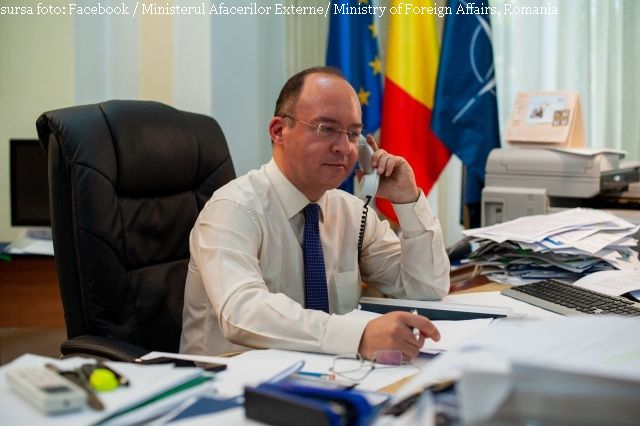Romanian – Ukrainian talks
The Romanian Minister of Foreign Affairs, Bogdan Aurescu, discussed on the phone with his counterpart in Kyiv, the new law on minorities in Ukraine

Leyla Cheamil, 12.01.2023, 13:50
The new minority law in neighboring Ukraine that restricts the rights of Romanians was the subject of Wednesdays telephone conversation between the head of Romanian diplomacy, Bogdan Aurescu, and his Ukrainian counterpart, Dmitro Kuleba. The discussion took place in the continuation of the one on January 4 between the president of Romania, Klaus Iohannis, and the Ukrainian President, Volodymyr Zelensky, during which it was agreed that the foreign ministers of the two countries would hold discussions to solve the problems reported by the Romanian side regarding the Law on national minorities (communities) in Ukraine, a document recently adopted and promulgated in Kyiv.
The law caused dissatisfaction in Bucharest, according to which there are provisions with negative consequences, by reference to European standards. In fact, Bucharest has been concerned for a long time with the way Kyiv treats its minorities. After the adoption of the document, the Romanian Ministry of Foreign Affairs termed as “regrettable” the fact that the law was adopted in the absence of a new consultation of the Venice Commission, “whose opinion would certainly have contributed to ensuring a comprehensive and clear text from the perspective of European legal standards in the matter, including by checking how its previous recommendations are reflected in the normative text”.
The MFA also conveyed, then, that it is also regrettable that the law was adopted in the absence of an adequate consultation with the representatives of the Romanian community in Ukraine, as requested by the Romanian side. Even if the law represents an improved version in relation to the previous projects analyzed by the Parliament in Kyiv, it does not guarantee, among other things, the right of the Romanian minority to education in their mother tongue, the Romanian MFI says.
Since the end of last year, the Romanian side has sent a list of the provisions of the law that it considered to have a negative impact on the Romanians living in the neighboring country. Thus, uncertainties remain regarding the concrete application of the use of minority languages in the administration, in the areas traditionally inhabited by people belonging to these minorities, Romania claims. There is also no provision regarding the use of the mother tongue in the relationship with the judicial authority.
Bucharest also states that unclear language is also maintained regarding the monitoring of the activities of civic associations of national minorities, and the right to manifest ones religion or belief does not benefit, further, from a distinct provision, being included only in the article relating to the right to freedom of expression. Another problem is, according to the Romanian authorities, the lack of funding for representative associations of national minorities, because the law only provides for the possibility of specific funding, based on projects, within the limits of the budget allocated annually for this purpose. (MI)






























